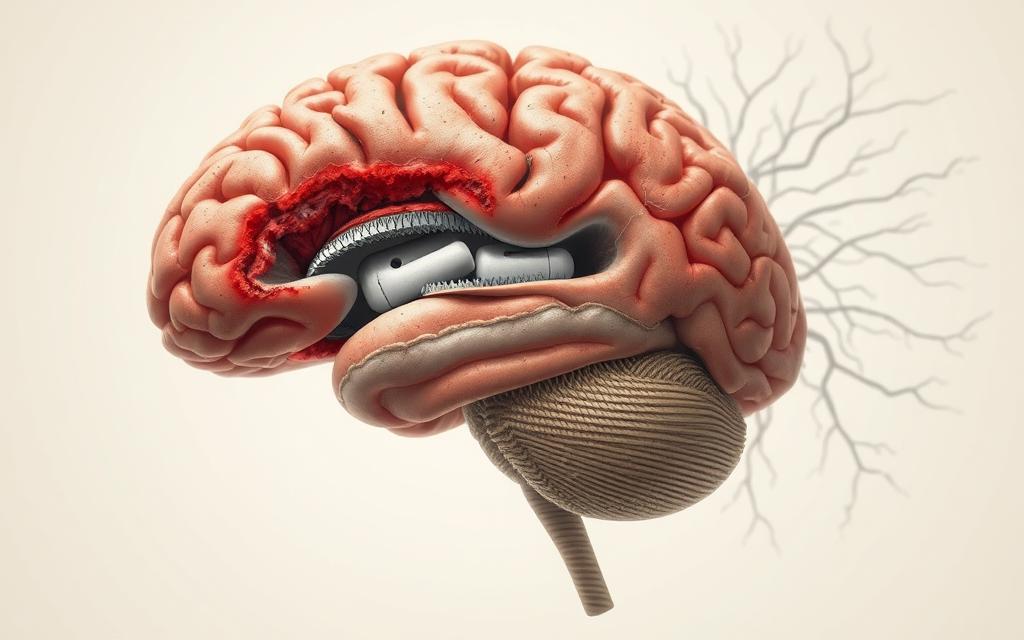Did you know that more than 760,000 people have died from opioid overdoses in the United States since 1999? This staggering statistic highlights the profound impact of substance use on individuals and society. The human brain, often described as the body’s most complex organ, plays a central role in how substances affect a person’s behavior and health.
Substance use disrupts normal brain function, altering the way neurotransmitters communicate. This interference can lead to significant changes in a person’s physiological processes, impacting everything from mood regulation to physical health. Understanding how these substances interfere with brain activity is crucial for addressing the broader implications of drug use.
This article explores the intricate relationship between substance use and its effects on both the brain and body. We will delve into how drug use alters neurological networks, the physical and mental consequences, and the importance of effective treatment and recovery strategies. By examining reputable sources and expert insights, we aim to provide a comprehensive understanding of this critical issue.
Key Takeaways
- Substance use significantly impacts brain function and behavior.
- Long-term drug use can lead to severe physical and mental health issues.
- Understanding the brain’s role is essential for effective treatment and recovery.
- Early intervention and proper treatment can reduce the risk of long-term consequences.
- The economic and social impact of substance use disorders is substantial.
Introduction to Drug Abuse and Its Implications
Substance use disorder is a growing health crisis in America, affecting millions each year. The term “substance use disorder” is now preferred over stigmatizing language like “drug abuse,” emphasizing the medical nature of the condition and encouraging compassionate understanding.
Overview of Substance Use in America
According to the 2020 National Survey on Drug Use and Health, millions of Americans suffer from substance use disorders. This highlights the widespread nature of the problem and the need for comprehensive solutions. The increase in overdose deaths involving synthetic opioids, which rose over tenfold from 2013 to 2019, underscores the urgency of addressing this issue.
The Urgency of Addressing Drug Abuse
Drug use is closely linked to serious health issues, particularly affecting the heart and other vital organs. For instance, substance use can lead to heart conditions such as arrhythmias and endocarditis. Additionally, it can impair liver and kidney function, further complicating overall health.
The implications extend beyond physical health. Drug abuse often leads to significant social and personal problems, including strained relationships, job loss, and financial instability. These challenges can create a cycle that worsens the individual’s situation and affects those around them.
How Drug Abuse Affects the Brain
The human brain, a complex and vital organ, is significantly impacted by substance use, leading to various changes in its function and structure. Understanding these changes is crucial for addressing the broader implications of drug use.
Mechanisms of Neurotransmitter Disruption
The brain operates through a network of neurons that communicate via neurotransmitters. These chemicals regulate essential functions such as mood and heart rate. However, substance use disrupts this delicate system by altering the release and uptake of neurotransmitters, leading to an imbalanced brain chemistry.
| Drug | Primary Neurotransmitter Affected | Mechanism of Disruption | Resulting Changes |
|---|---|---|---|
| Cocaine | Dopamine | Blocks reabsorption | Increases anxiety, elevates heart rate |
| Heroin | Endorphins | Mimics natural opioids | Slows breathing, reduces pain perception |
| Methamphetamine | Norepinephrine | Releases in excess | Heightens alertness, increases heart rate |
| Alcohol | GABA | Enhances activity | Produces sedation, lowers inhibitions |
Alterations in Neuronal Communication
Drugs create abnormal messages by mimicking or altering natural chemical signals. For instance, stimulants like cocaine can increase heart rate and anxiety, while opioids may slow breathing. Long-term use leads to brain changes, affecting cognitive functions and behavior, making it harder to experience pleasure without the substance.
The brain’s reward system is hijacked by drugs, leading to compulsive use despite negative consequences.” — Dr. Jane Smith, Neuroscientist
Effects of drug abuse on body and mind
Substance use disorder impacts both physical and mental health, causing immediate and lasting changes. While initial use may bring feelings of euphoria, it often hides underlying issues that can worsen over time.
Short-Term Physical and Mental Impacts
Right after using drugs, people might feel impaired judgment, mood swings, or physical symptoms like dizziness. These effects can lead to risky actions and accidents.
Long-Term Consequences of Substance Use
Long-term use can cause severe addiction and health issues. For example, alcohol can harm the liver, while other drugs might damage the heart. These changes can be lasting and affect overall well-being.
| Substance | Short-Term Effects | Long-Term Effects |
|---|---|---|
| Alcohol | Dizziness, slurred speech | Liver disease, heart issues |
| Opioids | Drowsiness, breathing slowdown | Addiction, organ damage |
| Stimulants | Increased heart rate, anxiety | Heart problems, mental issues |
Physical Consequences of Chronic Drug Use
Chronic drug use can lead to severe physical health issues, affecting various organs and systems in the body. The cardiovascular system, liver, and kidneys are particularly vulnerable to damage from long-term substance use.
Cardiovascular and Organ Damage
Drugs such as cocaine and methamphetamine can cause significant stress on the heart, leading to conditions like arrhythmias and heart attacks. Additionally, substances like alcohol and heroin can damage the liver, impairing its ability to detoxify the body. This can result in liver disease and other complications.
Changes in Body Functionality and Health Risks
Long-term drug use can lead to multi-organ damage, increasing the risk of diseases such as liver disease and stroke. The body’s ability to function properly is severely impaired, leading to a higher susceptibility to infections and other health issues. Early intervention and treatment are crucial in mitigating these physical consequences.
| Substance | Short-Term Effects | Long-Term Effects |
|---|---|---|
| Cocaine | Increased heart rate, high blood pressure | Heart attack, stroke |
| Heroin | Slowed breathing, drowsiness | Liver and kidney damage |
| Methamphetamine | Increased heart rate, anxiety | Cardiovascular collapse |
Understanding these risks and seeking professional help can significantly reduce the likelihood of severe health complications. Treatment and early intervention are essential for improving long-term outcomes and overall well-being.
Mental and Cognitive Effects of Substance Use
Substance use profoundly impacts mental health and cognitive function, leading to long-term changes in brain activity and behavior. Chronic use disrupts the brain’s reward system, primarily driven by dopamine, which regulates pleasure and motivation. This disruption can result in persistent mood swings and cognitive impairments.
Mood Alterations and Cognitive Impairments
Opioids and cocaine are known to severely disrupt cognitive functioning, affecting memory, attention, and decision-making abilities. These changes can hinder daily activities and overall quality of life. Research indicates that chronic substance use can lead to irreversible brain damage, increasing the risk of mental health disorders.
Substances like cocaine and opioids alter brain chemistry, leading to mood swings and mental health challenges. Studies show that prolonged use can result in anxiety, depression, and even psychosis in susceptible individuals.
The Role of Dopamine and Brain Reward Circuits
Dopamine plays a crucial role in reinforcing addictive behaviors by creating a cycle of craving and consumption. This overstimulation of the brain’s reward system makes it difficult for individuals to stop using substances despite negative consequences.
“The brain’s reward system is hijacked by drugs, leading to compulsive use despite negative consequences.” — Dr. Jane Smith, Neuroscientist
Addressing these mental and cognitive impacts requires comprehensive treatment plans that integrate mental health support and cognitive rehabilitation. Early intervention is essential to mitigate long-term damage and improve recovery outcomes.
Drug Abuse and Its Impact on Daily Life
Drug abuse deeply disrupts daily life, affecting relationships, work, and overall well-being. The challenges posed by substance use extend beyond physical and mental health, impacting social interactions, career stability, and financial security.
Social and Relationship Challenges
Substance use often leads to strained personal relationships and social isolation. Individuals may withdraw from friends and family, leading to feelings of loneliness and depression. The stigma surrounding withdrawal phases can further alienate those struggling with addiction, making it harder to seek support.

Occupational and Financial Consequences
Chronic drug use can severely impact career performance and financial stability. Activity levels at work may decline, leading to job loss and economic hardship. This financial instability can create a cycle of stress, worsening mental health concerns like depression and anxiety.
The Risk of Overdose and Daily Activities
Overdose is a real and dangerous consequence of drug use, disrupting everyday life and posing a constant threat. The fear of overdose can paralyze individuals, preventing them from engaging in normal activities and further isolating them from their communities.
Addressing these challenges requires a comprehensive approach, including professional support and community resources. Early intervention and treatment are essential to mitigate the far-reaching effects of drug abuse on daily life.
Understanding Withdrawal, Tolerance, and Cravings
Substance use triggers a complex cycle of withdrawal, tolerance, and cravings, significantly impacting both physiological function and daily life. These processes are deeply interconnected, creating a challenging barrier to recovery.
Identifying Short-Term Withdrawal Symptoms
Withdrawal symptoms vary depending on the substance but often include physiological and psychological signs. For instance, alcohol withdrawal can cause altered blood pressure, while opioids may lead to disrupted blood flow. These symptoms highlight the body’s struggle to function normally without the substance.
Development of Tolerance and Craving Cycles
Tolerance occurs as the body adapts to substance use, requiring larger doses to achieve the same effects. This cycle often leads to severe damage, as increased consumption strains vital organs. Blood pressure fluctuations and cardiovascular stress are common consequences, underscoring the urgency of addressing these issues.
Clinical studies reveal that repeated tolerance and craving cycles can cause irreversible harm, making early intervention crucial. Understanding these processes helps in developing effective treatment plans.
Treatment and Recovery Options for Substance Use Disorders
Overcoming substance use disorders requires a comprehensive approach that addresses both physical and mental health challenges. Effective treatment often combines medications, behavioral therapies, and community support to help individuals achieve long-term recovery.
Medications and Behavioral Therapy Techniques
Medications play a crucial role in managing withdrawal symptoms and stabilizing mood. For example, methadone and buprenorphine are commonly used to treat opioid addiction, reducing cravings and helping individuals remain in treatment. Behavioral therapies, such as cognitive-behavioral therapy (CBT), help individuals identify triggers and develop coping strategies to avoid relapse. Research indicates that combining medication with therapy significantly improves recovery outcomes.
Community Support and Rehabilitation Resources
Community support is vital for sustained recovery. Rehabilitation centers offer structured programs that address physical, mental, and social issues. Support groups like Narcotics Anonymous provide a sense of belonging and shared experiences, reducing feelings of isolation. These resources help individuals rebuild their lives and regain control over their well-being.
The journey to recovery is multifaceted, requiring patience and perseverance. By addressing the root causes of addiction and providing ongoing support, individuals can overcome the lingering issues that contribute to relapse and achieve a fulfilling life free from substance use disorders.
Conclusion
In conclusion, the impact of substance use on both physical and mental health is profound and far-reaching. The liver and other vital organs can suffer lasting damage, while conditions like psychosis and irritability often arise from prolonged use. These experiences underscore the importance of addressing addiction as a complex medical issue rather than a moral failing.
Comprehensive treatment programs, often centered at specialized recovery centers, are essential for effective rehabilitation. Early intervention, prevention strategies, and community support play crucial roles in minimizing long-term damage. Ongoing research and public awareness campaigns are vital in developing better solutions and reducing stigma.
If you or someone you know is struggling with substance use, seeking professional help is the first step toward recovery. Increased understanding and support can lead to better outcomes for individuals and society as a whole.
FAQ
How does drug use affect anxiety and heart rate?
Drug use can increase anxiety and elevate heart rate, especially with substances like cocaine, which stimulate the cardiovascular system. This can lead to panic episodes and long-term heart damage.
What is the difference between substance use disorder and addiction?
Substance use disorder and addiction often overlap. Addiction refers to compulsive drug-seeking behavior, while substance use disorder is a medical condition diagnosed based on patterns of drug use leading to significant impairment or distress.
How does treatment address drug use disorders?
Treatment typically involves a combination of medications, behavioral therapies, and support groups. Medications like methadone or buprenorphine manage withdrawal and cravings, while therapies help change behaviors and thoughts related to drug use.
What are the signs of a drug overdose?
Signs of overdose include slow or stopped breathing, unconsciousness, pale or blue-tinged skin, and lack of response. Opioid overdoses can be treated with naloxone, but immediate medical attention is crucial.
Can drug use lead to long-term mental health issues?
Yes, chronic drug use can contribute to mental health issues like depression, anxiety, and psychosis. It alters brain chemistry and function, potentially leading to persistent mental health challenges.


